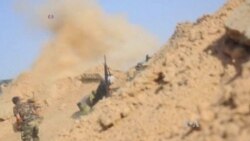The Islamic State militant group and its brutal imposition of an extremist ideology across Iraq and Syria must be defeated, the United States, its allies, the Gulf States and the governments of Iraq and Syria, all agree.
What would happen after that is much less clear.
A consensus is beginning to emerge that Iraq, and those supporting the Baghdad government, has to start addressing the underlying conditions that allowed the extremist Sunni Salafist group to emerge in the first place and, more than a year later, to take and hold so much territory.
“Daesh remains extremely resilient, ruthless, and capable of taking the initiative,” acknowledged U.S. Deputy Secretary of State Antony Blinken this week, using a local term to describe the Islamic State group.
But Blinken added, the coalition has the right strategy to defeat the group: a combination of “airstrikes, training, equipping and assisting and effective local partners.”
Reaching out to Iraqi Sunnis
Top leaders and analysts, however, are beginning to question what that defeat will look like if steps are not taken to reach out to the largely disenfranchised Sunni minority population and rebuild their shattered lives, as well as incorporate Sunnis back into the Iraqi Security Forces.
Brian Katulis, a senior fellow at the Center for American Progress, said to date, the U.S. approach has been overly focused on the battle and not enough on helping Iraq build the foundation for sustainable security.
“This threat from ISIS is political; it’s ideological, as well as being a security threat. And the main point is that our current approach has been largely counter-terrorist – trying to stop the threat of terrorism from reaching our shores,” Katulis said.
The biggest danger of not having a clear and effective post-ISIS plan, he said, “is that you will continually have this threat morph and migrate in ways that surprise a lot of people.”
Most analysts agree that the current damage in Iraq is the result of more than a decade of unfortunate U.S. and Iraqi political decisions, aggravated by increasingly sectarian Iraqi Shia-majority governments.
This worries Ben Barry, senior fellow for land warfare at the International Institute for Strategic Studies in London. “There is little that I’ve seen being done by the Iraq government to significantly help change this balance which as I’ve said is really the center of gravity of the conflict in Iraq.”
Fixing social systems
Salim al-Jabouri, Iraq’s Speaker of Parliament said he knows what has to be done, particularly in areas the government retakes from the Islamic State group.
“Defeating Daesh will not be achieved militarily,” al-Jabouri told VOA. “We have to fix our political and social systems. People should be able to earn a living. We have to focus on changing our ways of thinking. Daesh profits from people’s despair, telling them that their problems cannot be solved via political means. Therefore we have to solve our issues realistically. Also we should provide ways for all the refugees to return home in such a way that they don’t fall prey to Daesh.”
French Foreign Minister Laurent Fabius, speaking this week at a Paris conference of 25 countries fighting the extremist group, agreed that any military strategy “cannot be taken without the reconciliation policy and plans in Iraq. Everything is related.”
A senior State Department official said part of the plan in Iraq now includes supporting a new United Nations Development Program (UNDP) stabilization fund aimed at getting immediate assistance to areas cleared of Islamic State presence.
According to a UNDP spokesperson, the facility would fund public works and rehabilitation of such crucial infrastructure as clinics, water facilities, electricity, access roads, as well as disperse small job-creating grants for businesses such as bakeries and food kiosks.
Analyst Katulis warned the problem stretches far beyond Iraq and Syria. ““Unless all of the countries in the region do a better job in addressing the popular grievances in the sense of injustice, organizations like this will feed off of the lack of sustainable governance systems in the region,” he said.
Ali Javanmardi and Jeffrey Young contributed to this report.






